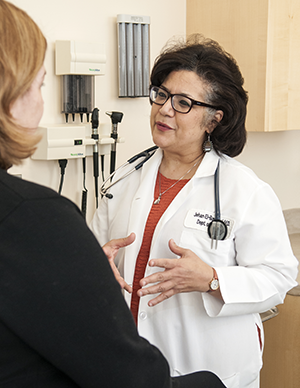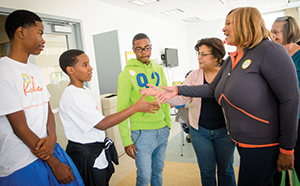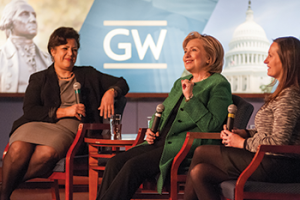Jehan El-Bayoumi, M.D., RESD ’88, dedicates herself to delivering medical care for all
Jehan El-Bayoumi, M.D., RESD ’88, holds an iPhone flush to her left ear. She has just emerged from her office, and she’s listening to the latest message that has rolled in. She smiles, extends her right hand, and introduces herself to a visitor. “Hi! I’m Gigi.” El-Bayoumi ushers her guest into her office, which is dotted with photos of people, colorful throw rugs from her travels, medical textbooks, and late-afternoon sunlight.

She says she likes to make her office a comfortable place. “It’s part of my heritage,” she says, referring to her Egyptian roots. “When someone comes to your home for a visit, you make sure they’re taken care of.”
El-Bayoumi is a general internist and associate professor of medicine at GW’s School of Medicine and Health Sciences (SMHS), where she completed her residency 30 years ago. “When I walked through the doors of GW, I fell in love with it,” she says. “It was my number one choice for my residency, and I was thrilled that I matched here.” Today, El-Bayoumi is more dedicated than ever to medicine. That means giving her patients the best care possible, teaching residents and medical students what good care is and how to provide it, and working with community organizations so more people can get the care they need.
El-Bayoumi is the daughter of academics, her father a physical chemist and her mother an anthropologist. One of three children, she was born in Tallahassee, Florida, and raised in Michigan, where she also attended medical school in Ann Arbor. She says she is not “one of these people who knew since she was young that she wanted to be a doctor.” Instead, she decided to go into medicine when she was a junior in college. “I have so many interests. I thought about being a journalist or writer. I love languages. I love math and science. I wanted to do something that involved service, so medicine made the most sense. It’s all there.”
And when she visited Washington, D.C., for the first time, she fell in love with the city — and its people. “One thing you need to know about me is that I chose to come to Washington,” says El-Bayoumi. “I had fallen in love with it because it reminded me of Paris, my favorite city. I really loved the people of D.C., and it struck me that D.C. is a tale of two cities, like many urban areas. So, it was really important that I do something for the people of D.C. And how do I show love to others? Through service.”
Medical Care for All
El-Bayoumi has dedicated her career to providing expert medical care for all, no matter their socioeconomic status. “I have taken an oath,” she says. “I do not pick and choose my patients. I take care of people. I don’t care what their socioeconomic background is. I take care of homeless people. I take care of colleagues. I take care of people from all parts of the city and all parts of the world.”

She also cares for some of Washington’s political luminaries. El-Bayoumi says some people might think it’s tough taking care of VIPs, but she says that’s not the case.
“They don’t want you to be overly deferential,” she explains. “You’re their doctor. You’re giving them advice. They want to be spoken to like anybody else.” Still, when treating government officials or even public figures, she says she has to be mindful of things she wouldn’t normally think about, like security concerns or Secret Service agents milling about. “But really, other than that it’s pretty much the same,” she says. Last fall, El-Bayoumi received a certificate of appreciation from the White House for providing expert care to members of the White House staff, including cooks, gardeners, and chiefs of staff. Although some White House staff receive care from military physicians, others come to GW. “If a member of the president’s cabinet or White House staff gets sick, they come here,” she says. “[As we would with] any other patient, we focus on them, not their jobs.”
Another of El-Bayoumi’s patients with a close connection to the White House was Hillary Rodham Clinton’s mother, the late Dorothy Howell Rodham. “I was friends with Mrs. Rodham,” says El-Bayoumi. “When she would come to the clinic, she would sit in the waiting room like anyone else. She was a really neat lady and a formidable woman. Probably one of the smartest people I’ve ever met. She was very interested in health, health issues, and health disparity. We actually had conversations about starting a health institute.”
Making Things Happen
And that’s exactly what came to pass. “After she [Rodham] died, it crystallized in my mind that the institute would be a way to honor her,” says El-Bayoumi. In 2013, El-Bayoumi became founding director of the Rodham Institute, whose goal is to achieve health equity in Washington, D.C. The institute, housed within SMHS, aims to cultivate and train the next generation of community health care providers to improve health for all.
One of the ways to accomplish that, says El-Bayoumi, is to keep clinician learners, medical students, residents, and faculty connected to the community. “It doesn’t have to be seeing people in the clinic,” she says. “It could be educating people about diabetes or their blood pressure. Or it could be exposing kids to health professions, kids who otherwise might not have much connection to health care providers or medicine.”
Merissa Zeman had been a patient of El-Bayoumi’s just once, a few years ago when she returned home to Washington, D.C., during a break from her undergraduate studies in Michigan. Now a second-year medical student at SMHS, Zeman heard about the Rodham Institute and went to meet with El-Bayoumi to learn more about it. Zeman says she didn’t think the doctor would remember her from that single office visit. But she did, says Zeman, with a laugh. What’s more, El-Bayoumi got her hooked on the institute.
“I went to meet Dr. El-Bayoumi and talk about the Rodham Institute, and the way she described it made me fall in love with its philosophy,” she says. “It was exactly what I had been searching for.”
Zeman says her goal is not only to help patients but also to make a bigger impact on the community at large and help change the way medicine is practiced. “It’s not hard to find people who believe that, but it’s hard to find people who practice that,” she says. “Dr. El-Bayoumi is the kind of doctor I want to be.”
Taking Up Residents

Jeffrey Zweig, M.D., a chief resident in internal medicine at SMHS, echoes that feeling. Zweig met El-Bayoumi when he was a fourth-year medical student at SMHS. “I was doing a visiting rotation, and my first impression of Dr. El-Bayoumi was, wow!” says Zweig. “She’s incredible — outgoing, caring, warm, and inclusive.”
He says one of the most important skills he has learned from El-Bayoumi is a caring bedside manner. “She makes patients feel at ease,” says Zweig. “She never rushes even if she seemingly has a thousand things on her calendar. I’ve tried to emulate that in my practice. In today’s age of robust technology and imaging and testing, she brings back the patient–physician relationship. She’s able to identify with any type of person, and that’s remarkable. That’s a gift.”
Zweig also says that even her residents feel cared for. “In a way, we’re like her children,” he says. “She cares about our well-being.” Her caring is evidenced in the many framed photos of residents that dot El-Bayoumi’s office. Smiling out of one of the photos are three residents, each in a white coat. Inscribed on its silver frame: “Chief Medical Residents 2012–13. With love and gratitude. Sarah, Ju, Amy.”
But El-Bayoumi says she too feels love and gratitude for her residents, colleagues, former students, and even patients, especially for the way they cared for her a decade ago after she was diagnosed with breast cancer. She underwent a bilateral mastectomy, chemotherapy, and later reconstructive surgery.
“My former students and residents were taking care of me,” she says. “I was taken care of by excellent colleagues. The attending physicians said, ‘We’re thinking of doing x, y, z, what do you think?’ I said, ‘You’re the doctors. I can’t be my own doctor.’ But just as importantly, I got loving and compassionate care. The amount of love that was expressed to me by my patients, in particular, was just unbelievable.”
El-Bayoumi worked throughout her chemotherapy treatments, which helped her cope with the illness, her treatments, and her recovery. “I would have chemo every other week and sometimes have meetings at the same time. I saw patients the whole time, too, and it helped me. It allowed me to focus outside of myself, and it’s all about things outside of you.”
El-Bayoumi’s phone rings, and she excuses herself, taking the call at her desk. She listens quietly. The husband of one of her patients is worried about his wife. She speaks softly, promising to follow up on his concerns, and then she goes quiet for a moment and smiles. “I love you back,” she says.
Related Content:
- A link to The Rodham Institute



